There are few meetings in American history which are
quite as surreal as the December 1970 pow wow between then President
Richard Milhaus Nixon and the King of Rock and Roll, Elvis Presley. It’s
hard to think of two more polar opposite seeming men, and yet the world
has proof that it really happened, in the form of an iconic photograph
that has become the most requested picture from The National Archives.
This oddball meeting of the minds has intrigued and
tickled the imaginations of Americans for decades, so it was only a
matter of time before it was turned into a movie.
Elvis & Nixon
takes a droll and
good-natured look at this famous get together. Two of our finest Oscar
nominated actors – Michael Shannon and Kevin Spacey – play the iconic
duo, two of the most important and powerful men of their time, who just
happened to also be near polar opposites. A terrific ensemble including
Alex Pettyfer, Colin Hanks, Johnny Knoxville, as well as director Liza
Johnson, and more help to flesh out this particular moment of American
history.
A week before the film opened, we were invited to a
press conference at the Conrad New York to chat with the cast and
director about Elvis & Nixon.
Kevin and Michael,
what was the process that you went through to do these two iconic
Americans?
Michael Shannon:
Well, it was really challenging for me, because there’s not much about
Elvis out there. (Everyone laughs.) I had to do some digging. No,
I just started by watching the films – both the narrative films and the
documentaries. That’s the Way It Is, Elvis on Tour. I
watched press conferences, much like this one – particularly one he did
in Houston, which pre-dates the events of this movie by a few months. I
found that one particularly enlightening. I
also had a great gift from Jerry Schilling, [who] Alex plays in the
movie. He gave me a 45-minute interview that Elvis had recorded for
Elvis on Tour, which they didn’t wind up using in the movie at all.
It’s an interview that not many people have heard. I, as all these
people will attest, listened to it constantly. I was either doing a take
or listening to that CD pretty much. That’s my exciting story.
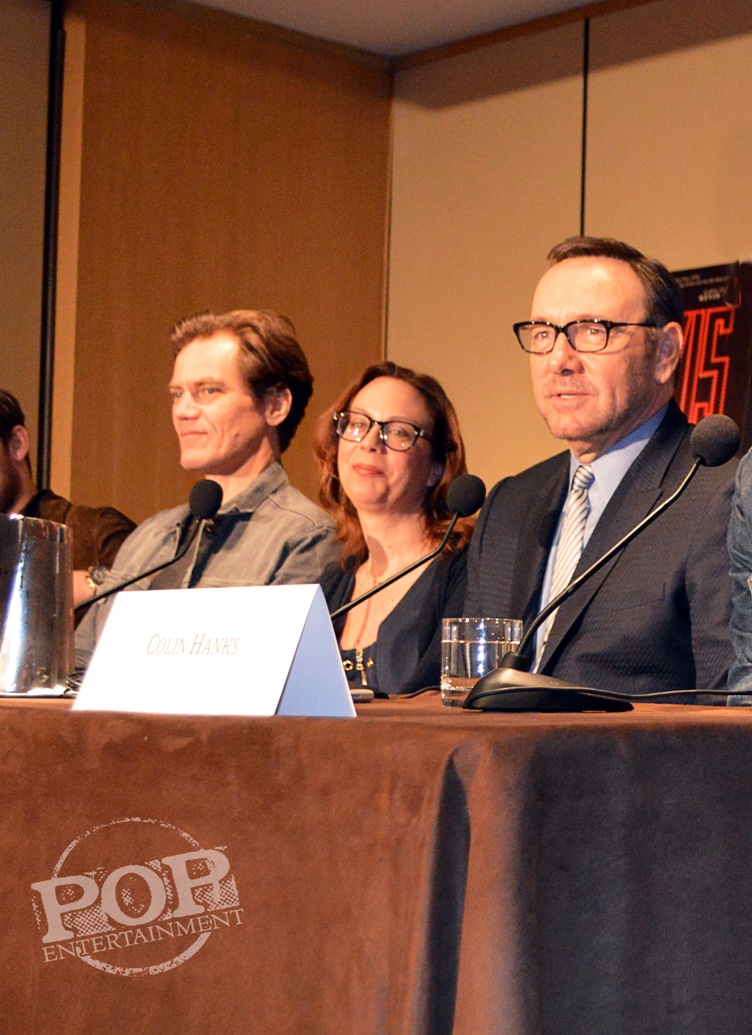 Kevin Spacey:
Weirdly, I had a previous experience in attempting to play Richard Nixon
when I screen-tested for Frost/Nixon. Which is, by the way, I
will just point out, a movie I did not get.
Kevin Spacey:
Weirdly, I had a previous experience in attempting to play Richard Nixon
when I screen-tested for Frost/Nixon. Which is, by the way, I
will just point out, a movie I did not get.
Liza Johnson:
This is totally a revenge thing.
Kevin Spacey:
Yeah,
this is my revenge film. At the time, Ron Howard, even though he
ultimately did choose Frank Langella who’d done the stage version, asked
a number of actors that he was interested in seeing if we could go on
tape and present a Nixon. I was in Las Vegas shooting a movie, and in
the hotel room there, with my makeup and hair people on that film, put
together a version. I filmed like four scenes, including the farewell to
the White House staff. Then, I thought I lost this DVD. I thought it was
gone. But anyway, I located it when I knew I was going to come on to
this film. I was able to watch what I did wrong in that. Some of the
major reasons why I didn’t get that role were very clear to me as I
watched it all these years later. I thought, “Well, you’re not going to
do that again!”
But it was actually very helpful….
These are two figures who, obviously, people
know so much from the way they presented themselves. There’s so much
public stuff but not that much private stuff. I found a recent
documentary that used a lot of footage behind the scenes of Nixon that
Haldeman shot. Our Nixon is what it was called. I found that very
helpful. Also [there were] a lot of photographs of Nixon just looking
remarkably uncomfortable in chairs. That I found very useful. Then, of
course, the many, many, many hours and hours of tapes of private
conversations: I thought that P is really an F sound. Private
conversations I found very helpful, because this was a private meeting,
even though the photograph became quite public. That was interesting to
me, to try to understand what Nixon was like in private. I came away
feeling that he swore more than any human being I’ve ever heard on tape,
and he was decidedly grumpy. Something was always “fucked up.”
Michael and I both didn’t want to feel that
we had to do an imitation in any way, but to try to find an essence of
each of these figures and then allow them to respond to each other
genuinely. I think what was most interesting was the fact that these two
people you wouldn’t think would have anything in common actually, at the
end of this meeting, had sort of an appreciation for each other.
I
was going to ask you something a bit along the lines of what you just
said...
Kevin Spacey:
(teasing) Well, then don’t. I hate repeating myself. (Everyone
laughs)
Why
do you think that people are so fascinated by this meeting between two
such different men? It’s such an odd couple. The photo is so well known,
but everyone has their own ideas of what happened. Did you know anything
about what happened before taking the role?
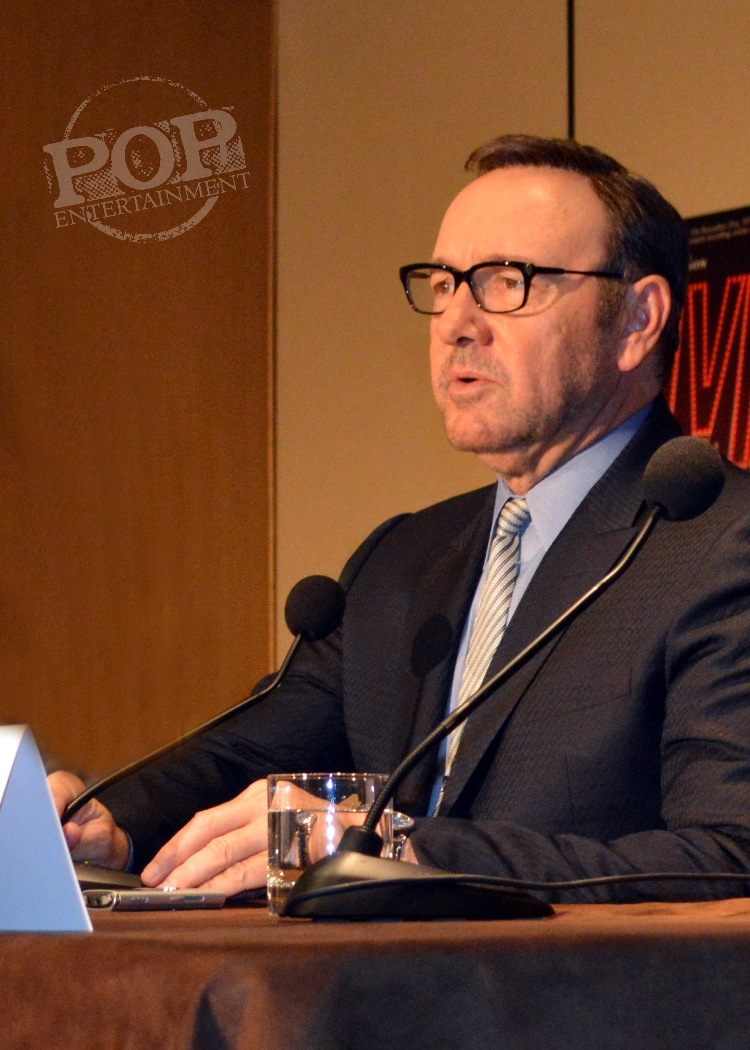 Kevin Spacey:
No, I was 13 when Nixon resigned. (To Johnson) Did you?
Kevin Spacey:
No, I was 13 when Nixon resigned. (To Johnson) Did you?
Liza Johnson:
I was actually born the week before this meeting. But I think that the
script when I received it actually does get at why people are so
fascinated by that photograph. To me it’s because both of those men are
so iconic and so well-known, but for radically different things, right?
Elvis is known for defining a rock & roll youth culture, for being as
cool as shit. Nixon is, I think, a super-effective president. He has a
huge fan base. People are incredibly interested in him. He’s not known for
being cool as shit. I think that not only in their personal style, like
what they’re each wearing in that photograph, but also what they’re
known to stand for in American culture is very dissonant. Just the
juxtaposition even within the photograph has an absurdity to it that I
think has been drawn out and explored by the script that we all got.
Michael Shannon:
Somebody said something interesting to me the other day. They said,
“Yeah, I didn’t know that Elvis was so conservative. Is that true?” I
said, “Well, first of all, Elvis never talked politics with anybody.” He
didn’t think it was anybody’s business what his politics were. He didn’t
think it was his place to instruct people on politics. He was a singer.
But also, I think it points out an interesting trait in Elvis. Elvis was
always incredibly aware of who he was talking to. He was willing to have
whatever conversation the other person wants to have. I think one of the
real charming things about it was seeing Elvis meet this man who is
perennially grumpy and actually coax him into having a semi-decent time.
I think that’s maybe what’s interesting about it.
Alex Pettyfer:
Don’t forget your karate moves.
Michael Shannon:
My karate moves. Johnny was my trainer. It was a quick session.
Johnny Knoxville:
Why don’t we show the price of my karate moves?
I noticed in the film that a lot of the dialogue was actual
conversation. Did you embellish to add more drama or humor?
Kevin Spacey:
There was a dog, but we cut it. (Everyone laughs.)
Johnny Knoxville:
Kevin came up with some really good buttons on some scenes. A lot of the
buttons you see on the Oval Office scenes are things you came up with.
Kevin Spacey:
I’m a done man...
Johnny Knoxville:
Hearing him swear as
Nixon was very satisfying. But he didn’t
have to add too much to the story because the story is so bizarre. The
truth of what happened is so insane that we just were true to the story.
Now, Liza would allow us to go off book a take or two, but we stayed
true to the story.
Kevin Spacey:
Most of that stuff is cut out of the movie.
Johnny Knoxville:
Yes. Yes.
Alex Pettyfer:
The cool cap was you
dropping the gun.
Kevin Spacey:
The
thing is also that while this was such a famous meeting, it wasn’t
recorded. So, in a way, it allowed us, and certainly the screenwriters,
to be able to imagine what a lot of this conversation was, although the
character that Alex plays [Jerry Schilling] was there and was sort of in
and out of the room, as was the character that you play (to Colin
Hanks, who played Bud Krogh). So, they were helpful in terms
of snippets, but I think it was expanded. That’s the fun of it that we
could imagine it.
Colin Hanks:
You want to see Elvis give a karate demonstration in the Oval Office.
You want to see it. Did it happen? You still want to see it.
Liza Johnson:
That’s one of the things that is beautiful about fiction and that you
can do through drama. If I was a detective, I could make a version of
everything we know to be exactly true. That would have a certain kind of
truth value. There are other things that we know that are emotionally
true. Like we know a lot about Jerry’s friendship with Elvis that we
were able to study actually with Jerry Schilling and through his book. I
believe that there are some relatively small changes in time frame and
things like that, that we decided to put in this movie, in this time
frame. If we leave that out of the movie, does that make it more true or
less true? Because we know these things are emotionally true, right? So
if that happened on a Thursday, so that can’t go in the movie, does that
make the movie more true or less true?
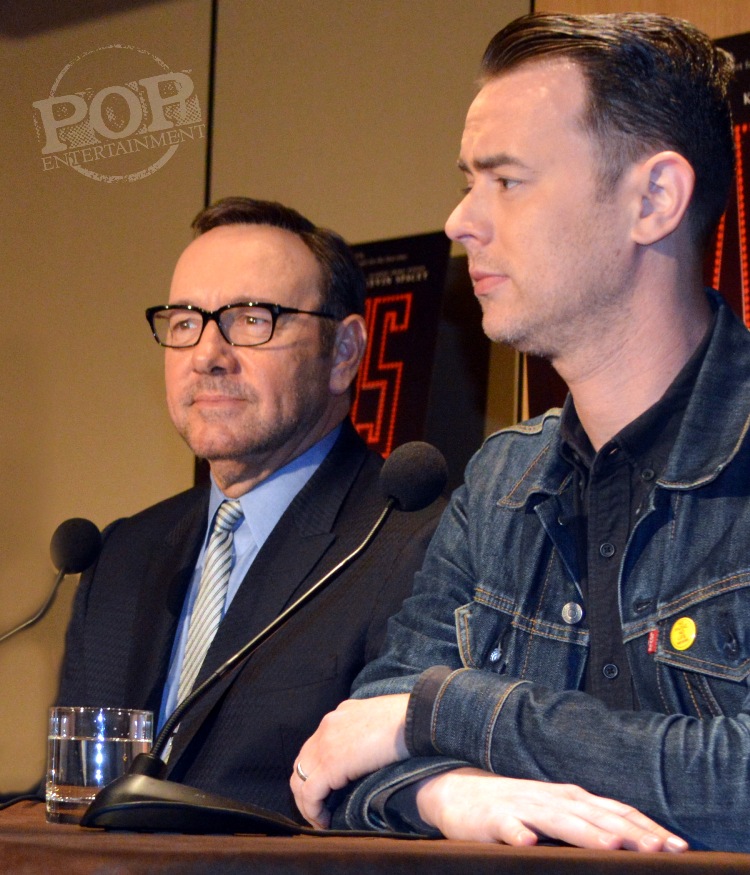 Kevin you’ve been playing a lot of presidents: Nixon, and of course
Frank Underwood...
Kevin you’ve been playing a lot of presidents: Nixon, and of course
Frank Underwood...
Kevin Spacey:
Yes, I’m only ever going to play Presidents from now on. (Everyone
laughs.)
In the current crop of the Presidential race, which do you think you’d
be best as? Also have all these projects made you more interested in
politics?
Kevin Spacey:
I’ve always been interested in politics.
No
particular election has ever put me off politics. I think some elections
are more amusing than others, and I’m all for the entertainment factor.
I love a good laugh. I very much enjoy doing House of Cards. It’s
an incredible job to have. I wouldn’t want to play any of the current
people running for office. That I think that would be bad casting.
However, now that I look at you (turns to Colin Hanks)...
Colin Hanks:
Stop!
Don’t finish the sentence. Hillary. I’d play Hillary.
Kevin Spacey:
No, I
think Cruz. You could be Cruz. A little orange makeup.
Colin Hanks:
A lot of
orange makeup.
It
was interesting that Elvis didn’t want it to seem like he used his
celebrity to get to meet Nixon, but obviously he did. Have any of you
ever used your celebrity to get something you wanted?
Colin Hanks:
Aside
from dinner reservations? I think we’re all guilty of trying to get a
better table at a restaurant, but that’s about as far as I feel
comfortable going. Even that’s like ripping a Band-Aid off very slowly,
painfully. “Hi. Just wondering. Can we get a table for two? It’ll be at
the bar. That’s fine. That’s fine.”
Kevin Spacey:
I used
to walk up to Broadway theaters when I was starting out and broke and
wanted to go see a play. Because I had been doing stand-up comedy and I
did a Johnny Carson impression, I would pretend at the box office to be
Kevin Carson. (Does a Johnny Carson voice.) “There’s two tickets
under my name.” The most surprising thing is that I usually got in.
They’d usually go like (makes an anxious face). I’d say,
“Somebody from the Tonight Show set this up at NBC.” It was always early
previews, and they wanted the house to be filled. So, they’d give me
tickets. So, in a sense, I used Johnny Carson’s celebrity to get into
theaters.
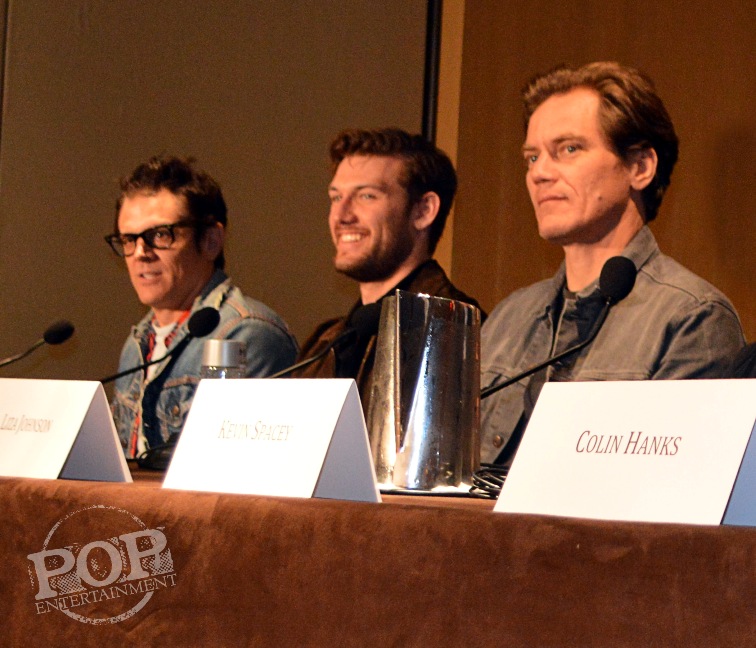 Johnny Knoxville:
That’s
a complex matrix, actually – the combination of Carson and early
previews. It’s very diabolical.
Johnny Knoxville:
That’s
a complex matrix, actually – the combination of Carson and early
previews. It’s very diabolical.
Kevin Spacey:
(As Johnny Carson) I did not know that!
Michael Shannon:
Speaking of late night talk show hosts, I’m just glad I got on Letterman
before he retired. That’s about it. (Everyone laughs.)
Alex Pettyfer:
Good times.
Have
you shown the movie to the Nixon family or the Presleys? Or do you plan
to?
Kevin Spacey:
We can fly them all to a screening together in a tent. (Everyone
laughs.)
Liza
Johnson:
Do you know what I want to read? This is not an answer to that exactly,
but a friend of mine told me that in the John Dean biography, there is a
chapter about this San Francisco theater company, The Cockettes. They
did a piece called “Tricia’s Wedding.” [It was based on Nixon’s
daughter.] Apparently, in John Dean’s biography, all of the Nixon boys
gather to analyze how to respond to the Cockettes piece. If we could
organize something like that, I’d really be happy.
Johnny Knoxville:
I’d really like to get into the Cockettes.
All:
You’re
in.
Michael Shannon:
He’s not with us now, but
Jerry
Schilling, who Alex plays in the movie, kind of shepherded this project
along. It was very sensitive for him. He’s been asked over the years to
be involved with projects about this subject, and he’s always declined.
The one you mentioned earlier he’s not a fan of. When he got on board
and gave us his support, he was there on set every day. That meant a
lot. I don’t know if Priscilla [Presley] has seen it yet. I was in
Jerry’s car driving around Memphis with him, and his cell phone rang. It
was Priscilla calling from London. He was like, “Yeah, I’m sitting next
to Mike. He’s going to play…” That was one of the more surreal
experiences of my life. But I don’t know if she’s seen it yet, or if she
will see it. Obviously, it’s hard for her.
Liza
Johnson:
I was
concerned actually, just because some of the more comic moments came to
the public first, through the trailer. I thought that was fine for the
public, but for the people who really have a stake in the reputation of
Elvis or Nixon, I thought, oh, I wonder how that will be. I don’t know
if Priscilla has seen it. I do know that some people who were friends
have seen it, and their favorite scene was in a way the most absurd. Of
course, people really do deserve to have whatever response is their true
response and I honor that and hope for the best on that front, but I was
encouraged by the fact that they came to a certain moment and actually
liked it.
Kevin Spacey:
Which is?
Liza
Johnson:
In the trailer, there is this scene... (to the reporters) you’ve
all seen the movie, right? There is a karate element and then there is
an element with the knuckles.
Johnny Knoxville:
Sounds kinky.
Liza
Johnson: I
was told Elvis’ cousin really appreciated that moment, because they
actually used to play a game like that.
After playing
Nixon, Frank Underwood and Richard the Third, are you drawn to these
Machiavellian figures of power?
Kevin Spacey:
Actually, I suppose in hindsight, and certainly knowing what happened to
Richard Nixon with Watergate, you could put it in that category. But
what was interesting to me about this Nixon is that he’s not saddled
with Watergate. In fact, he hadn’t started taping in the White House,
and wouldn’t for another year and a half or so. This wasn’t, for me,
exploring a dark, Machiavellian figure. There are elements to his
paranoia, elements to the sense that something was always fucked up, or
wrong, or people were screwing up, or whatever. That was interesting.
But I actually think the conversation and how it shakes itself out [is
what is interesting]. How Elvis provides for Nixon this conversation
which is he highly insinuate, which was brilliantly played by Michael,
in terms of giving him what he wants. What he wants to hear. A
conversation I think that Nixon didn’t expect. So for me, [this is] a
different kind of Nixon from the two other figures that you mentioned.
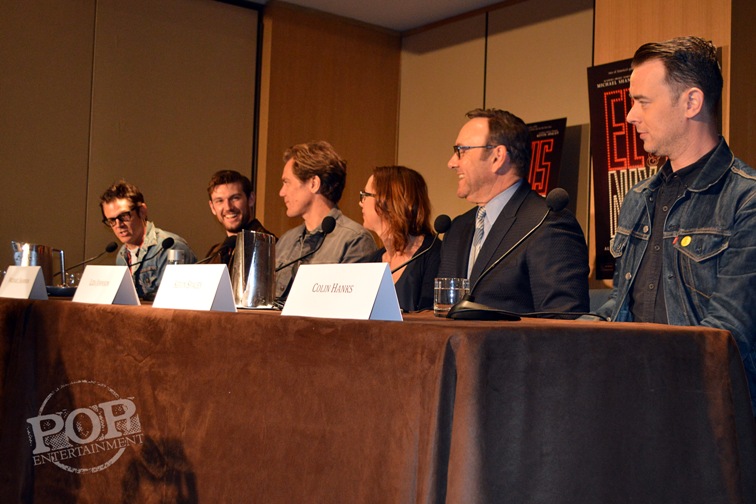 Beyond the comedy, there is a bit of a melancholy feel to the movie. How
do you find the balance between comedy and drama?
Beyond the comedy, there is a bit of a melancholy feel to the movie. How
do you find the balance between comedy and drama?
Kevin Spacey:
Drinking. I find
drinking helps.
Michael Shannon:
For me, yeah, I have
to give Liza a lot of credit for that. Like I said, Jerry gave us our
marching orders from the beginning. He said,
“I don’t want this to be silly.” Both
of these men merit attention and respect. There’s so much already in
popular culture, the mocking caricatures of these two people. Why add to
that? Life’s too short. It’s such an amazing opportunity, because on one
hand this is a real event, and on the other hand it’s an imaginary
event. You don’t get that opportunity very often. When I say it out loud
it doesn’t even make any sense, but it’s the truth. I think that’s how
we both work. I think everybody in the cast... Alex was incredibly
devoted to Jerry, spent a lot of time with Jerry. [He] was very
interested in capturing Jerry’s point of view in the story. And Johnny
and Colin. Everybody showed up to work. Even the day players just had a
respect for it. The humor is inherent with it. The humor you don’t have
to go looking for. It’s there.
Liza
Johnson:
There actually weren’t really jokes. I think we all acknowledge that
there was a comedy to this situation, but there’s only like two jokes in
the script. Half the time when we were rehearsing, you guys refused to
say them, because you were like, “This isn’t a joke movie.”
Johnny Knoxville:
It was
very awkward when we shot the scene in the airport. I loved the scene,
but we finally came face to face with an actual Elvis impersonator. It
was very jarring, I think, for all of us because it was pretty deep into
the shoot. Joe was actually involved in the writing of the screenplay.
And he was a huge fan of Elvis. But I remember that day being like, “Oh,
thank God we’re not doing that because
that would get old fast.”
Alex Pettyfer: That was actually an amazing day because Jerry was on
set, and he was so devastated and upset by how his best friend had been
portrayed for so many years. Kudos for Michael – Michael, as we all
know, is an incredible actor – to come on and play the real Elvis. A man
that has had trouble with things before, [Jerry] was at a certain place
at that time and not recognizing that kind of comical element that we’ve
seen. We all have an impression of this man. I think the impression that
people have was that this man was so charismatic, so charming. [He] had
this charisma that exuded who he was. There was an amazing scene that we
had that was when he talks about putting on these layers, he’s a
different person when he goes out into the public. I think what’s great
about this movie, even in Nixon as well, you see two real men, who are
perceived in the public as two charismatic men, who had power in
different elements. Putting them together and seeing that was fun.
What
was the most difficult part about bringing your character to life? And
what was the best part of the film as an actor?
Kevin Spacey:
We’ll start over here on the left. (points to Colin Hanks)
Colin Hanks:
The chance to work with everyone at this table was really the big one
for me. At this stage in my career I always want to be in a room where I
know I’m going to be entertained and challenged. When that room happens
to be the Oval Office and you have guys like these... and women like
these... people like these, you search out that opportunity.
I really didn’t worry too much about trying to impersonate Bud
Krogh, but there were two days that really stick out in my mind. One was
when I was told, “Hey, Bud Krogh’s coming to set, and he wants to meet
you.” I just went, “Oh, okay, great! Hope he likes it!” I was petrified
about meeting the guy, but Bud turned out to be a very, very kind man
who really enjoyed himself. He had a really good time. My favorite part
was... well, there were a bunch. The first day, working with Kevin,
seeing what he was really doing, was really, that was a fun one, because
all of us were sitting down, reciting about seven pages of dialogue.
Alex
Pettyfer:
Jumped right in.
Colin Hanks:
We just jumped right in, yeah. That was a fun
one. The other one was getting to sit down with Michael, as I was
explaining the protocol of meeting the President. He had this line...
I’m not sure if it’s in the movie. I actually haven’t seen it yet.
Liza
Johnson: I
can’t believe they haven’t shown it to you.
Colin Hanks:
Yeah, no.
Kevin Spacey:
If you’re not busy, we’re showing it tonight. (laughs)
Colin Hanks:
He had this one improv that absolutely just slayed me. We were talking
about “Don’t drink the President’s
Dr. Pepper. If you want, I can get you a Coke.”
The line was “I’m more of a Pepsi man.” But he came up with an improv,
he says, “I’m more into Mountain Valley Spring Waters. It’s bottled at
the source.” Just the fact that he’d said that [was amazing]. Because
I’d read the “bottled at the source” underneath that every time [on the
bottle]. The fact that he’d went that deep in detail: no, I’d prefer
this water because it’s bottled at the source. It just made me laugh.
Johnny Knoxville:
That’s all he’d drink.
Colin Hanks:
Yeah, I
know. That one really stuck out for me as one of my [favorite parts].
In
immersing yourself in this very secretive character, even if he wasn’t
completely that way yet, how are you and are you not like Nixon?
Kevin Spacey:
It’s a really interesting thing to always play any character. Try to
relate to that character, in terms of what qualities are ones that I
understand. Even if somebody does things that I would never do, and
behaves in ways that I would never behave. Or maybe behaves in ways I
have behaved. There’s always this interesting thing. It’s like if you
mention being a detective, it’s the way I feel about acting. We are
given clues by a writer or by someone’s essence or persona. It’s our job
to try to figure out which of those clues are true. Which of those clues
we decide to follow. Which of those clues we think are red herrings, or
only the way another character thinks of that character. I guess it’s
the reason why it’s interesting, this kind of a role; we have had many
actors in the past play Richard Nixon. Different times, different
styles. Or, why we love going and seeing Shakespeare. Or Michael is
doing Long Day’s Journey Into Night. How many incredible actors
have taken on those roles in that play?
Michael Shannon:
(Points at Spacey) Him.
Kevin Spacey:
There’s something incredible about watching what someone else does with
a role that we know. [Like] the Hamlets, or the Henry Vs, or the
Othellos, or the Cleopatras that you’ve seen on stage. There’s something
really interesting about the way each individual actor approaches stuff.
Some of that stuff is entirely part of our process. That I’m not so
eager to talk about, these are investigations that you have to do.
Sometimes you walk away from playing somebody and think: Wow, that was
as far from my own experience as I can possibly be. Sometimes you walk
away and you think there are qualities in that character I didn’t
realize I had. Those can be both interesting and uncomfortable. The
journey that we go on as actors is an interesting one, and sometimes a
revealing one.
CLICK HERE TO SEE WHAT KEVIN SPACEY HAD TO SAY TO
US IN 2010!
CLICK HERE TO SEE WHAT MICHAEL SHANNON HAD TO
SAY TO US IN 2009!